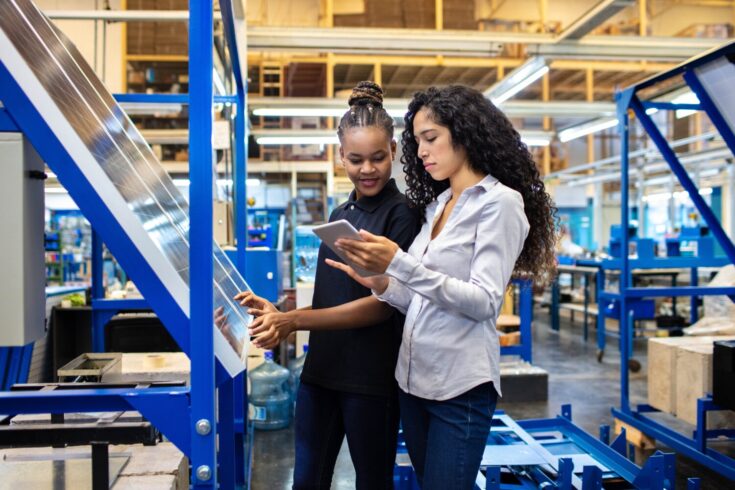New opportunities have opened, including £20 million for a new Sustainable Smart Factory competition and almost £4 million for a new ESRC network.
The Made Smarter Innovation programme, delivered by UK Research and Innovation (UKRI), has launched a new collaborative research and development competition focusing on sustainable smart factories. This funding call presents a huge opportunity to launch a wide range of projects that bring a significant benefit to our planet, helping to achieve net zero.
Consortiums of UK registered business and organisations can apply for a share of up to £20 million for digital innovation projects that will reduce the carbon emissions of manufacturing processes in factories. The aim of the competition is to support the development of digital innovations to improve the sustainability of manufacturing processes, resulting in either reduced material or reduced energy consumption.
Applications are encouraged from consortiums comprising a mix of manufacturing and technology development capabilities working together on innovative developments or novel applications of digital technologies. Projects can:
- range from £1 million to £8 million
- run for up to two years
- tackle themes such as reducing in-process material losses, better sequencing manufacturing operations to reduce energy consumption.
Accelerating digital innovation
The funding call is split into two strands, each with a specific focus but one common aim. The aim is accelerating digital innovation to reduce overall manufacturing CO2 emissions:
- strand one: digital innovation with manufacturing data
- strand two: digital innovation in manufacturing processes.
Chris Needham, Innovation Lead for Made Smarter Innovation, UKRI said:
Pushing the boundaries of how we can better acquire and utilise data, together with novel applications for other digital capabilities within manufacturing processes, will unlock new ways to drive down energy consumption or optimise how much material the overall production process consumes.
UK organisations working together to inspire these digital breakthroughs can cumulatively make a real difference in reducing the draw on the world’s resources.
InterAct
A new Economic and Social Research Council Network Plus has also launched to bring an economic and social science dimension to the Made Smarter Innovation programme. The new network is led by co-directors:
- Professor Jan Godsell of Loughborough University
- Professor Jill MacBryde of the University of Strathclyde.
It will look at the social and economic factors that will be hugely influential in achieving a more productive and competitive to help reach net zero.
InterAct seeks to ‘pioneer human insight for industry’. It is a call to arms for academics from the social sciences to support the innovation and diffusion of digital technologies that will result in a stronger, more resilient, manufacturing base. Working alongside other partners within the wider Made Smarter community, the long-term vision is to build a strong, vibrant, interdisciplinary community to support UK manufacturing.
This is an exciting 38-month programme of work, commencing from November 2021 and due to end December 2024, officially launching at Digital Manufacturing Week. Along with Professor Jan Godsell and Professor Jill MacBryde, the programme will be supported by a dedicated Network Management Team and a core research team from:
- Loughborough University
- University of Strathclyde
- University of Sheffield.
Made Smarter Innovation will be showcasing at digital manufacturing week, on 10 to 11 November 2021. Register now to hear more about InterAct and the Sustainable Smart Factories competition.
Strong and resilient manufacturing base
Jill MacBryde commented:
Our long-term vision is to build a strong, vibrant, interdisciplinary community to support UK manufacturing in the adoption and development of digital technologies that will result in a stronger, more resilient, manufacturing base. We know that technology alone is not enough.
We need to harness the knowledge of people and society to really reap the full benefits that technology can bring. Whilst there are clear advantages of this network for the economy, manufacturers and technology providers, there are also benefits for the academic communities.
Collaborative working, new challenges and contexts will open up new avenues for world leading research.
Diversity and inclusivity
Jan Godsell says:
Looking to the future, our aspirations for InterAct is a community, with clear added value for all, where stakeholder groups want to engage and be part of the MSN+. We will embed diversity and inclusivity. Diversity of thought will bring benefits of multiple perspectives. Inclusivity will help us to embrace and collaborate with existing research groupings, rather than compete with them.
Participation will be based on expertise, not status, and we will seek to develop people at all stages of their careers. Our vision of success would be that the InterAct is seen as a partner of choice: easy to work with, welcoming, and professional. Ultimately, we would like to be a one-stop shop that curates existing and emerging knowledge and capabilities (research and education) and showcases leading practice.
Prosperous economy
Chris Courtney, Challenge Director for Made Smarter Innovation, UKRI said:
Digital technologies have the power to radically transform how we manufacture and deliver the products and services of the future and deliver a more sustainable, resilient, prosperous economy with fundamental changes to the nature of work. The Sustainable Factory competition will support digital innovation that helps accelerate the journey to net zero.
The InterAct programme will ensure we harness the insights from the economic and social sciences to deliver that positive future and I’m delighted that Jill and Jan will lead this exciting programme of work.
Top image: Credit: alvarez / Getty Images

